Advancing Health’s Work in Progress (WiP) Seminars highlight the cutting-edge research that our scientists are working on to improve health outcomes. This fall, guest presenter Dr. David Kealy discussed the importance of identity in young adults’ mental health; Dr. Troy Grennan shared results from the Doxycycline for STI Prevention (DISCO) study; and Dr. Habib Chaudhury, with PhD Candidate Ziying Zhang, highlighted findings from their physical environmental evaluation of a care village in Comox, B.C. These summaries are modified from our live tweet threads covering the presentations. Follow us @AdvancingHlth!
Trigger warning: This article mentions suicide, suicidal ideation, and suicide attempts, within an academic context.
Identity in young adults’ mental health: Understanding and intervening
With Guest Presenter, Dr. David Kealy, Associate Professor in the UBC Department of Psychiatry
“Who are you?”
Dr. David Kealy opened our 2023/2024 WiP Seminar series posing the question to introduce the topic of identity. Identity is especially important during adolescence and early adulthood because this is a prime time for the emergence of mental health disorders. Understanding one’s identity addresses important, high-stakes personal questions including: “What am I doing in my life?” and “What kind of relations and work do I want?”
Erikson’s stages of identity development, outlined below, show that the psychosocial crisis of identity versus confusion can start as young as 11. This is when adolescents are trying to define themselves, an important prerequisite for healthy relationships in adulthood.
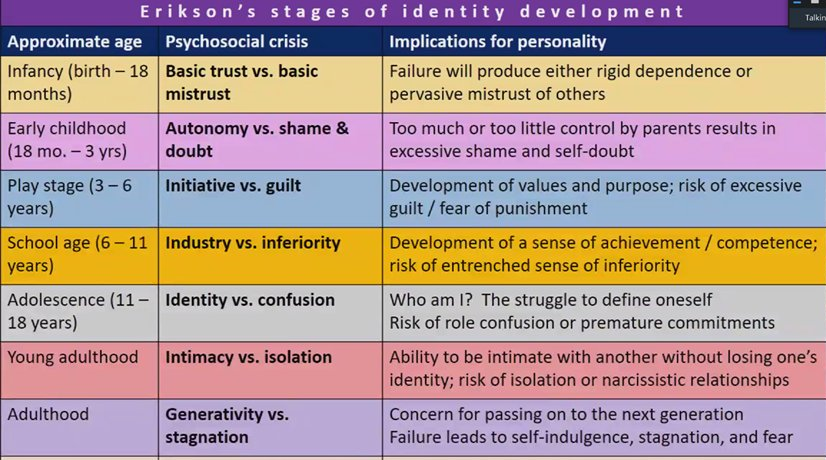
Distress and confusion about one’s identity during adolescence may impede the ability to make healthy decisions related to mental and physical well-being. For example, a harmful belief that may result from challenging developmental experiences, such as trauma experienced in childhood, is “Do I deserve to be cared for?” Dr. Kealy emphasized that these types of thoughts can prevent the development of positive and adaptive self-identity. It is this crucial point where there is an opportunity for early intervention to alleviate identity distress.
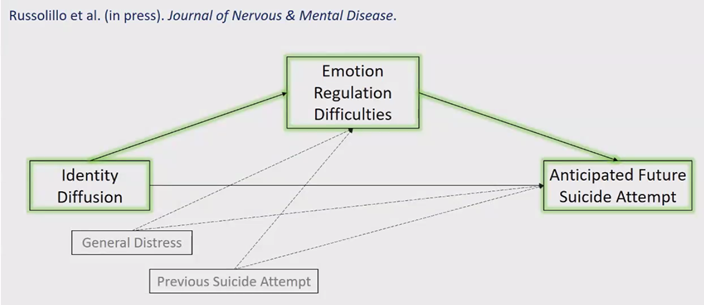
A publication currently in press, led by Dr. Angela Russolillo, Advancing Health’s Psychiatry Program Head highlights the connection between identity diffusion, difficulties in emotion regulation, and the likelihood of future suicide attempts. This research showed that identity diffusion, where a person has not developed a strong sense of who they are, has an indirect effect on suicidal ideation partly due to difficulties in emotion regulation. This effect persists even after accounting for general distress and a history of previous suicidal behaviour, highlighting the importance of knowing oneself.
Dr. Kealy then discussed the Potential Selves Intervention, which is aimed at finding and modifying harmful beliefs, helping young adults become aware and reflective of their identity. This conversational intervention uses supportive–expressive counselling based on therapists’ individual case formulation. Therapists set goals to understanding their clients’ goals and harmful beliefs, using attitudes and interventions to challenge these beliefs, and encourage reflection about identity and possible selves.
Encouragingly, the results of this intervention show an impressive retention rate of 93.6 per cent, with over 86 per cent of adolescents and young adults finding it helpful and doing better!
Want to learn more? Watch the WiP!
Doxycycline for STI Prevention: Evidence-to-date and overview of the DISCO Study
With Advancing Health Scientist Dr. Troy Grennan
There have been significant increases in bacterial sexually transmitted infections (STIs) over the past decade, particularly among gay, bisexual, and other men who have sex with men (gbMSM) and transgender women. Previous research has shown a significant benefit of the antimicrobial doxycycline in preventing some of these STIs, including syphilis, chlamydia, and gonorrhea. Our October 4th WiP Seminar featured Dr. Troy Grennan, the lead scientist for the Doxycycline Intervention for bacterial STI ChemoprOphylaxis (DISCO) study.

Doxycycline is a broad-spectrum antibiotic that has been in use since the 1960s. It works by inhibiting microbial protein synthesis and is generally safe, with the most common adverse effects impacting the gastrointestinal tract. Most of the work completed thus far has examined doxycycline post-exposure prophylaxis (doxyPEP), where a dose of doxycycline is taken following a sexual encounter. A smaller amount of research has looked at the efficacy of doxycycline pre-exposure prophylaxis (doxyPrEP), where doxycycline is taken daily to prevent STIs.
Data from pilot studies (n=82) evaluating doxyPrEP showed that it was promising, but the studies weren’t large enough to determine efficacy. Data from larger studies (n=1279) evaluating doxyPeP showed it significantly reduced STIs in gbMSM and transgender women, but not cisgender women.
But how does doxyPrEP compare to doxyPep?
Dr. Grennan highlighted that, although it may be assumed that patients would prefer doxyPEP, conversations with the community suggest that it may be easier to incorporate doxyPrEP as a part of a daily medication routine, rather than as something to remember to take when the opportunity calls for it. The DISCO study is the first of its kind looking to compare these two STI prevention interventions and is currently enrolling participants.
Visit the DISCO website to learn more: https://godisco.ca
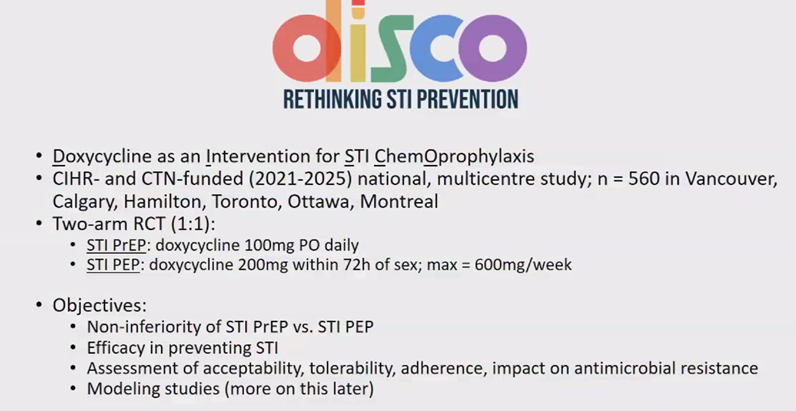
Want to learn more? Watch the WiP!
Physical environmental evaluation of a care village in Comox, B.C.
With Advancing Health Scientist Dr. Habib Chaudhury & PhD Candidate Ziying Zhang
The first publicly funded care home in British Columbia based on the “dementia village” model is set to open in three years in Comox. It is called Providence Living at the Views. The “dementia village” model is unique compared to other long-term care homes because it creates a neighbourhood environment with familiar places, including access to nature, a bistro, an art studio, childcare, and community spaces for different generations to connect.
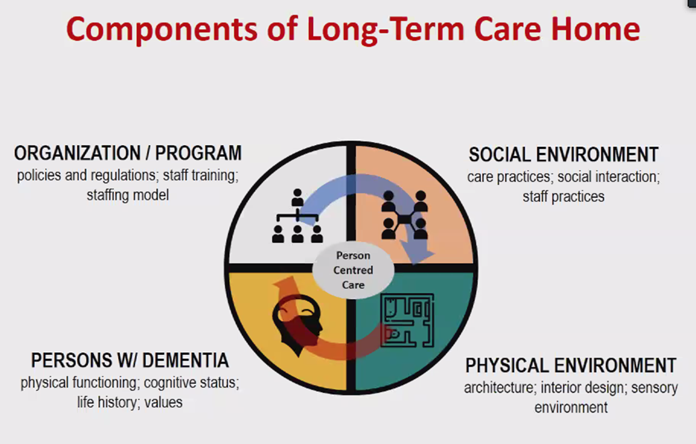
To maximize the benefits for residents, the long-term care home needs to focus on organization/program, the social and physical environment, and people with dementia. The reimagined care home will be a 156-bed village and use a small-scale housing model with a personalized, resident-driven style of care.

As part of a broader evaluation project, Advancing Health Scientist Dr. Habib Chaudhury, along with PhD candidate Ziying Zhang, has evaluated the physical environment of the current, traditional care home and conducted a baseline evaluation prior to relocation. They plan to do the same for the new village model care home after the facility is operational. They looked at corridors, exits, dining areas, and main and secondary activity spaces, as well as interviewed residents and staff.
Ziying Zhang shared several interesting findings from observations on how the current environment affects residents’ quality of life and how staff take care of them. Some key takeaways include that the main dining and activity space being large and visually undifferentiated. The staff have separated these larger areas into zones for when they are working, one for independent residents and one for less independent residents who need more support. There is also a central area for activities and a mobile refreshment cart at certain times. However, the activity area lacks storage space and residents have limited say on how this space is used.
The future long-term home care space will be taking the following top 10 design principles to improve upon several observations made during the baseline evaluation:
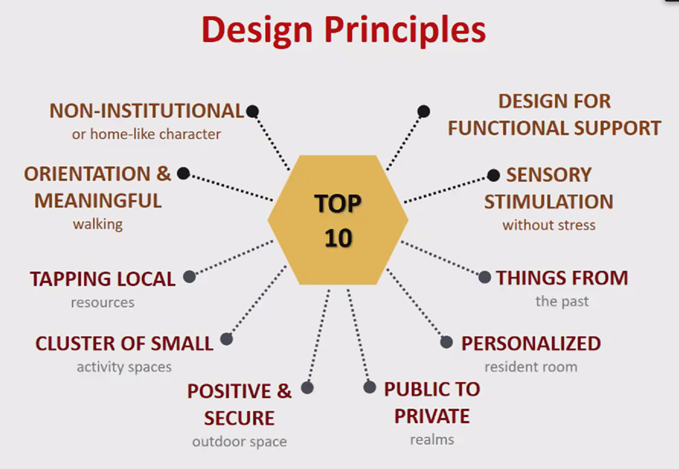
Want to learn more? Watch the WiP!
Note: Images have been screen-captured from the WiP presentations and may be slightly modified for this article.



